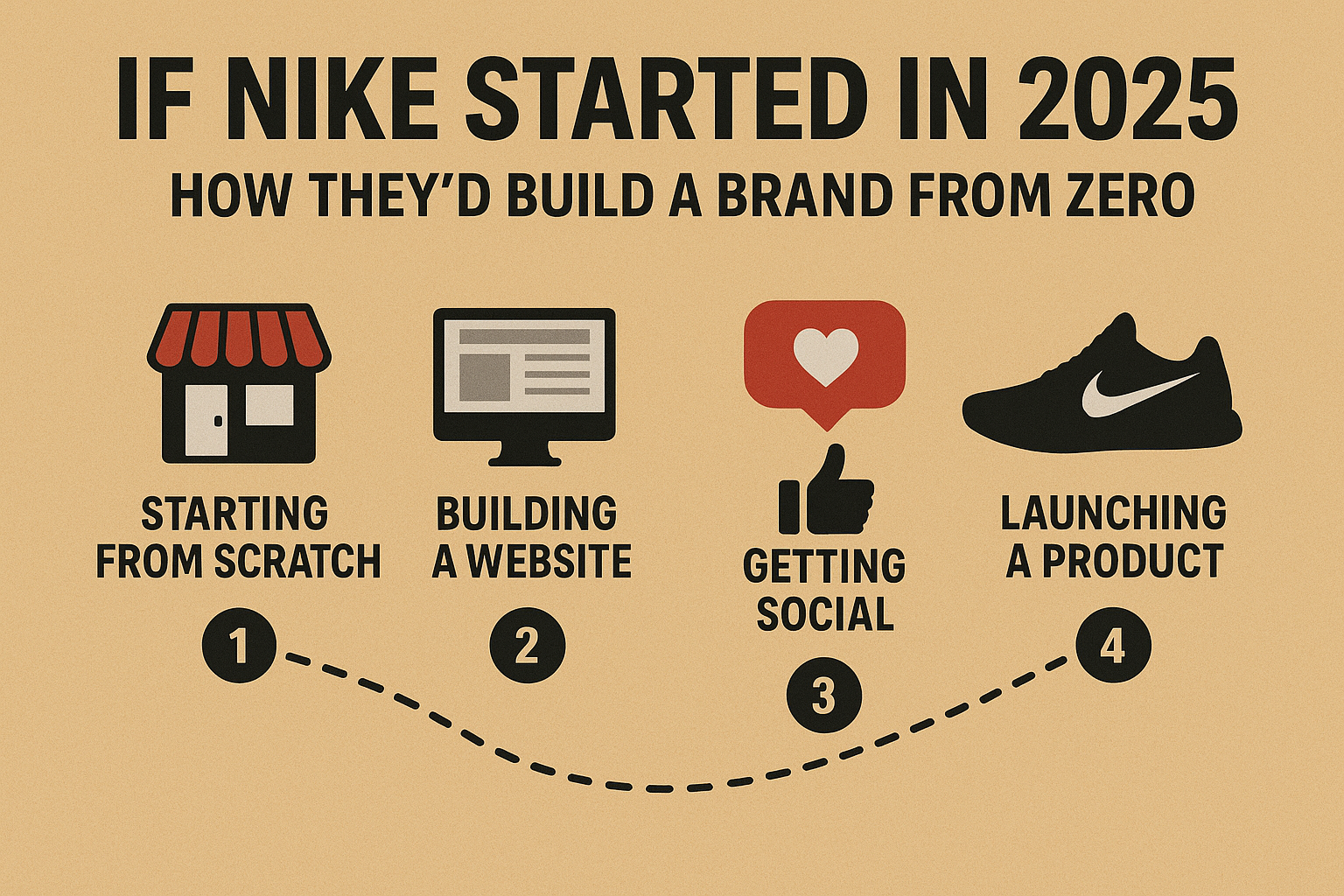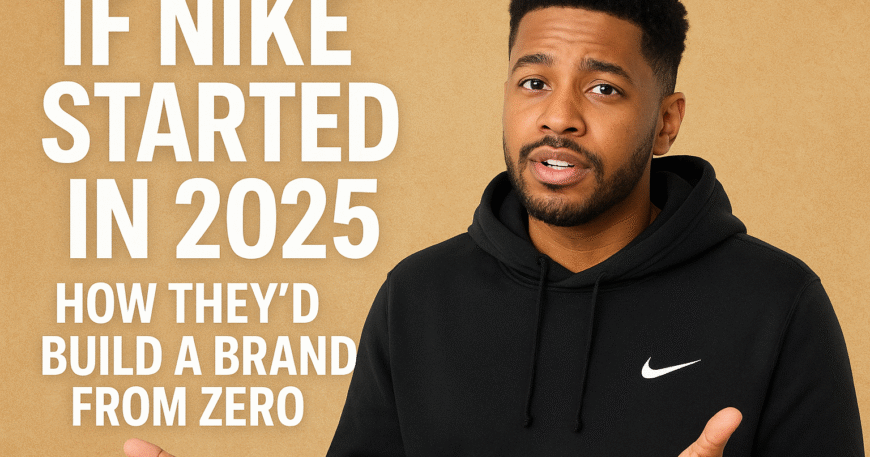Table of Contents
- The Pain Point: Why Small Businesses Struggle to Stand Out
- The Hustle is Real: The US Small Business Reality Check
- Enter the Nike Story – Reimagined in 2025
- Building the Brand Playbook (The Modern Way)
- What Small Businesses Can Learn from This
- The Real Shift: It’s About Emotion, Not Marketing
- Closing Thoughts
The Pain Point: Why Small Businesses Struggle to Stand Out
Let’s cut through the fluff: building a business in America today is brutal. It’s not about having the “best” product anymore—because chances are, ten other people are already selling something almost identical to yours on Amazon, Etsy, or Shopify.
The real pain point is visibility and trust. Customers don’t just stumble upon you anymore. You’ve got to fight for every second of their attention. And even if you win a scroll or a click, you still have to prove you’re worth sticking around for.
Imagine pouring your savings into launching your coffee shop, your fitness brand, or your handmade jewelry line… only to see your Instagram posts get 11 likes, your ads eaten alive by Meta’s algorithm, and your neighbors saying, “Oh, I didn’t even know you had a store.”
That right there—that’s the heartbreak moment every US small business owner faces. Not failure of effort. Failure of visibility.
The Hustle is Real: The US Small Business Reality Check
Here’s what it really looks like when you’re on the grind:
- You wake up early to post content before heading to your day job.
- You answer customer DMs at midnight while trying to watch Netflix.
- You pour money into ads, but they don’t convert like those YouTube gurus promised.
- Your family doesn’t fully get why you’re doing this when a 9-to-5 would feel “safer.”
Sound familiar? You’re not alone. According to the SBA, 1 in 5 US small businesses don’t make it past year one. Not because they’re lazy or not smart—but because standing out is harder than ever.
And honestly? Competing with billion-dollar corporations who can slash prices, buy Super Bowl ads, and throw influencers six-figure contracts—it feels unfair.
This is where the story of Nike becomes so powerful. Because once upon a time, they were you. And if they were starting from scratch in 2025, they’d face the exact same wall you’re staring at now.
Enter the Nike Story – Reimagined in 2025
Forget the 70s story of Phil Knight selling sneakers from the trunk of his car. Let’s hit the reset button.
It’s 2025. Phil is just a guy with an idea and a Shopify account. Zero followers. No investors. Just a dream. He launches his site, slaps some sneakers online, and waits. And… nothing happens.
But here’s the magic: Nike wouldn’t panic about low likes or crickets in the comment section. They wouldn’t even obsess over the shoes at first. They’d focus on building a story that cuts through the noise.
Instead of saying “Check out our lightweight sneakers,” Nike in 2025 would say:
“This isn’t about shoes. This is about proving something to yourself.”
That’s the hook. In a world flooded with products, Nike would still lead with emotion. They’d show you the local kid running at 5 a.m. before school. The mom who refuses to give up her fitness goals despite working two jobs. The 40-year-old who laces up sneakers for the first time to reclaim their health.
Suddenly, it’s not about sneakers anymore—it’s about you. That’s how Nike would win in 2025.
Building the Brand Playbook (The Modern Way)
So what would Nike’s actual playbook look like today?
- Start with the Pain, Not the Product. They wouldn’t market comfort or design. They’d tap into that universal feeling of being underestimated. Everyone has been told “you can’t.” That’s the emotional fire Nike would ignite.
- Short-Form Content Domination. Forget glossy commercials—Nike would go viral on TikTok. Not with big celebrities, but with raw, gritty stories that feel real. A 20-second video of a teenager training in a broken-down gym would hit harder than any Hollywood ad.
- Community First, Always. Instead of just pushing products, Nike would create a movement. Imagine Discord groups for everyday athletes, pop-up local runs, or micro-collabs with creators who have 2,000 loyal fans instead of a million passive ones.
- Consistency > Perfection. They wouldn’t wait for a “perfect” campaign. They’d post messy behind-the-scenes, user-generated content, even bloopers. Because in 2025, realness trumps polish every time.
- Direct-to-Heart, Not Just Direct-to-Consumer. You wouldn’t just buy sneakers. You’d buy belief. You’d feel like joining Nike was joining a tribe.

What Small Businesses Can Learn from This
Now here’s where you come in. You don’t need Nike’s billions to apply their mindset. You just need their playbook.
- Tell your story, not your specs. Nobody cares if your coffee beans are “triple roasted.” They care that your coffee fuels exhausted parents chasing their dreams.
- Find the transformation. Don’t sell “what it is.” Sell “what it does for me.” Nike didn’t sell sneakers—they sold possibility. You can sell confidence, freedom, joy.
- Leverage your size. Big brands can’t be personal, but you can. Handwrite thank-you notes. Show your face on Instagram. Reply to comments like a real human. That intimacy is your superpower.
- Lean into micro-communities. Instead of wasting money on broad ads, invest in the 50 people who actually ride with you. Those 50 will turn into your first 500.
The Real Shift: It’s About Emotion, Not Marketing
The truth is, consumers today don’t want another product—they want a brand they can believe in. That’s why people tattoo the Nike swoosh, not because they love rubber soles, but because they see themselves in the story.
Small businesses often think they need to look “professional” like the big guys. Wrong. What you need is to look human. Messy, passionate, authentic. When people buy from you, they’re not just buying—they’re rooting for you.
Think about it: what if you could make your first 100 customers feel like they’re part of your comeback story? That’s how loyalty is built. Not with discounts. With belonging.
Closing Thoughts
If Nike started in 2025, they wouldn’t succeed because of a flashy logo or big budgets. They’d succeed because they’d tell a story so powerful that people wanted to be part of it.
That’s the blueprint for every small business hustler out there right now. Don’t chase trends. Don’t drown in ads. Build belief.
At the end of the day, you don’t need a million followers. You just need the courage to say:
“Here’s my story. Here’s why it matters. Join me.”
And that’s your “Just Do It” moment.




